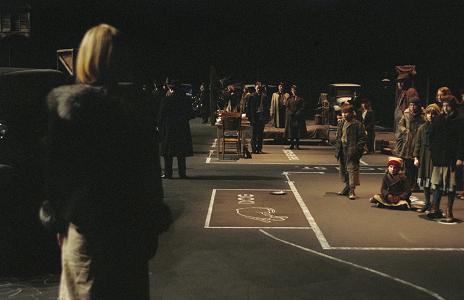(previously: There Will Be Blood)
“This is the sad tale of the township of Dogville. Dogville was in the Rocky Mountains in the US of A, up here where the road came to its definitive end, near the entrance to the old abandoned silver mine…”
I first saw “Dogville” in October 2003, when it had its Montreal premiere at the Festival du Nouveau Cinéma, and it ranks as one of the most powerful, memorable screenings I’ve ever experienced. When my friend Alex and I staggered out of the theatre, we both agreed that we’d seen a truly great film. A masterpiece, really. An instant classic, even.
Yet, while I’ve seen all the other movies who’ll form my Best of the ’00s list numerous times, I never went back to “Dogville” until now. In part, for the same reason I never went back to “Irréversible” and other pictures that are brilliant but also a punishing watch, but mostly because as mentioned, that one screening was so affecting that I feared that revisiting the film would only make it lesser in my mind.
And you know what? It kinda did for a while. Because the sheer novelty of nearly all of it being set on an almost empty soundstage with chalk outlines is gone. Because unlike during my first viewing, I couldn’t be “fooled” by Dogville along with Grace this time and spend the first act growing to love the characters, as I knew that the town and its people would reveal to be “rotten from the inside out”.
Then again, I was still awed by the cleverness of the “illustration” imagined by writer-director Lars von Trier, the stark Anthony Dod Mantle cinematography, the note perfect supporting cast (Paul Bettany, Philip Baker Hall, Lauren Bacall, Patricia Clarkson, Stellan Skarsgård, Ben Gazzara, Chloë Sevigny, Zeljko Ivanek, Jeremy Davies, etc.), the wonderfully literate and deceivingly appeasing storybook narration read by John Hurt, the use of classical music (Vivaldi, Handel, Albinoni…) and, of course, the heartbreaking performance of Nicole Kidman as the “beautiful fugitive” that is Grace Margaret Mulligan.

As the story unfolded, even though I knew where it was going, I grew more and more unsettled, nearly as much as the first time I saw the film. To see the pure and vulnerable Grace be exploited so awfully by these folks who figure that hey, if you can make a person work more for less pay, why not take advantage of it? And if you can strip her away from her rights… abuse her… humiliate her… This leads to increasingly disturbing, twisted and perverted scenes, and the worst is that this isn’t merely an invention of von Trier’s sick mind: everything in “Dogville” and then some has happened in our world, is still happening and will probably still continue to happen forever… Human nature, I guess.
One thing that only occurred to me now but which sorta seems obvious in retrospect is how this is in many ways a biblical allegory, with Grace as Christ going through his/her Passion and being forgiving of men because they know not what they do, and her gangster boss father (James Caan) as the Old Testament God, who’s more prone to unleashing great vengeance and furious anger… Except that in this version of the story, Christ ends up realizing that maybe you can indeed hate people for their weakness and that wiping them out might be the wise thing to do…
The climax of “Dogville” remains as jaw-dropping as ever, and the photographic coda set to David Bowie‘s Young Americans is still a huge emotional gut-punch. A truly great film? A masterpiece? An instant classic? Check, check and check.

